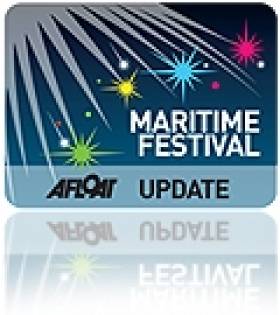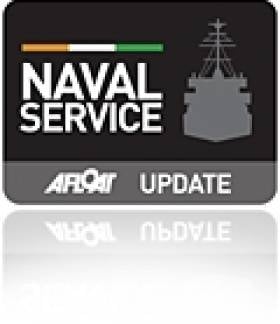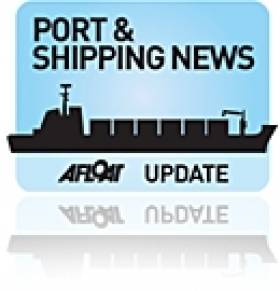Displaying items by tag: Commodore John Barry
Wexford Festival to Celebrate Founder of US Navy
#WEXFORD MARITIME FESTIVAL - The John Barry Maritime Festival as previously reported is to take place on the weekend of 23-24 June where a packed festival programme outlines various activities and events, writes Jehan Ashmore.
As the festival is named after the Wexford-born Commodore John Barry, the father of the US Navy, there will be a contingent representing the navy who are to visit the festival. At the end of the festival one of the highlights will be the annual John Barry Memorial Ceremony. This is to be officiated by Major of Wexford Davy Hynes and attended by international dignitaries.
Throughout the festive weekend, the coastal town which is synonymous with its fleet of colourful dredging trawlers lining the quays will celebrate its rich maritime culture and heritage.
Wexford Harbour will be a visual array of boats and an air-sea rescue display by the Irish Coastguard (noting new SAR helicopter) and RNLI lifeboat and Naval Service. Also on hand will be the Irish Whale and Dolphin Group which will have a stand and Met Eireann will also be on the quay providing information and demonstrations to the public on marine safety.
Among the events to be staged is a rowing regatta of traditional sailing cots to modern fibre glass rowing boats, sea kayaking, canoeing, sailing and raft races on view from Wexford Quay marina.
In addition a 26,000 sq ft exhibition centre will house over 100 handcrafted model boats. There will be exhibitions about John Barry, the Titanic and an interactive media exhibition of maritime activities and local artists and photographers.
There will be entertainment in the form of traditional Irish music, dance groups, evening music on the Saturday and Wexford traders will be showcasing local produce on the quay. To consult the festival programme including fringe events visit www.johnbarrymaritimefestival.com
Homage Paid to Irish Founder of Argentinian Navy
#ADMIRAL BROWN- As Wexford is to host The John Barry Maritime Festival this summer, the father of the US Navy and commodore is held in the same league of Admiral William Brown, who founded the Argentinian Navy, who was remembered in a ceremony over the weekend in Buenos Aires, writes Jehan Ashmore.
The commemoration was to mark the 155th anniversary of William Brown's passing which took place at the Recoleta Cemetery, which was headed by Vice Admiral Carlos Alberto Paz, Chief of Staff of the Argentine Navy.
Among those attending were the Irish Ambassador, Mr. James McIntyre, the Chairman of the National Brownian Institute, Prof. Emilia Menotti, the President of the Naval Club, Vice Admiral Eduardo R. Llambi (Ret.) and City Council Officials.
The Navy General Directorate for Education marching band was also present, as well as Officer Cadets from the Admiral Brown Naval Lyceum (Reserve Officers' Academy). The Irish flag was carried alongside the host country by officers of the HQ Security Marine Bn.
For more about the event which included Santiago L. Aversa who represented the Irish branch of the Maritime Institute of Ireland (click HERE) and where its maritime museum in Dun Laoghaire is due to reopen early next month as previously reported on Afloat.ie
In 2006 the Naval Service 'flagship' L.É. Eithne (whose adopted homeport is Dun Laoghaire) under the command of Commodore Mark Mellett, made a historic first for the Naval Service when visiting Argentina and other South American ports.
In the same year two identical statues of the admiral were unveiled, one in Dublin's Docklands at Admiral Brown Way and Westport, Co. Mayo where the admiral hailed from.
Admiral Brown won victories against the Spanish and Brazilian fleets and as such he is regarded as a national hero, where in excess of 1,000 streets, 400 statues and venues such as stadiums (including football teams) schools, several towns, and a major city bears his name.
- naval service
- Argentinian Navy
- L.E. Eithne
- Commodore John Barry
- Admiral William Brown
- Commodore Mark Mellett
- M.I.I.
- Maritime Institute of Ireland
- Mariners Church Dun Laoghaire
- Maritime Museum Dun Laoghaire
- Dublin Docklands
- The John Barry Maritime Festival
- Admiral Brown Way
- Irish Ambassador McIntyre
- Westport Co Mayo
- Wexford Town
‘Follow The Fleet’ Schools Essay Competition
Theme 1. Maritime History
Commodore John Barry- Father of the American Navy
The Adventures of Gráinne Mhaol
Admiral Francis Beaufort's Scale
Write an historical essay on one of these famous Irish mariners and their journeys of discovery and adventure. You can include pictures or photos if choosing this category to support your essay. The pictures or photos will need to include elements of geographical representation and can include pictures of vessels, land marks, vegetation or animals pertinent to the essay.
Theme 2. Maritime Trading in Ireland –Life of a Container
An essay on a trade route from or to Ireland and progress that a container carried on a cargo ship will make. You will need to describe the size of container, what cargo it will carry, the type of ship it will travel on, the port it will depart from and the port it will go to and the places the ship may call in-between. The nominated trade routes are:
Ireland – Norway.
Ireland – Italy.
Ireland- France.
You can include pictures or photos if choosing this category to support your essay. The pictures or photos will need to include elements of geographical representation of the two countries and can include pictures / photos of land marks or cargo pertinent to the Journey.
Theme 3. Technology and the Master Mariner.
An essay on how technology helps the working life of a ships captain. You can include details on the types of technology used aboard ship including:
Telecommunications on Ships
Navigating Ships and Technology
Technology & Safety at sea
Entrants can include pictures or photos if choosing this category to support your essay. The pictures or photos will need to be representative of the technology used on board ship.
You are free to choose an essay title from any of the 3 themes listed above. For further information about essay guidelines, entry forms and competition details and rules they can be found HERE


























































